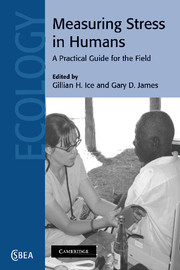Book contents
- Frontmatter
- Contents
- Contributors
- Foreword by Geoffrey A. Harrison
- Part I General principles
- Part II Measuring stress responses
- Part III Practical issues in studying stress
- 8 Measuring stress in special populations
- 9 Study design and data analysis
- 10 Protection of human subjects in stress research: an investigator's guide to the process
- 11 Epilog: summary and future directions
- Index
- References
11 - Epilog: summary and future directions
Published online by Cambridge University Press: 11 September 2009
- Frontmatter
- Contents
- Contributors
- Foreword by Geoffrey A. Harrison
- Part I General principles
- Part II Measuring stress responses
- Part III Practical issues in studying stress
- 8 Measuring stress in special populations
- 9 Study design and data analysis
- 10 Protection of human subjects in stress research: an investigator's guide to the process
- 11 Epilog: summary and future directions
- Index
- References
Summary
Despite the fact that the biological and behavioral responses to the ever-changing conditions in real life define a very important and central component of survival, it is interesting that very few human biological and anthropological researchers include measurements of these responses in their evolutionary study of contemporary humans. The psychobiology of stress, in fact, is often overlooked in evolutionary and ecological studies of human population variation. Part of this oversight may be related to a lack of information on how to study stress under the conditions of real life. This volume will hopefully provide some guidance for researchers interested in expanding their field research to include an assessment of the adaptation to stress.
It is apparent from the contributions to this volume that there are both conceptual and technical issues to consider when evaluating psychobiological adaptation in field studies. As articulated in Chapter 9, researchers need to formulate a plan, and as part of that formulation, carefully determine what is or is not “stressful” in the context of their study. Perhaps a better way of framing this formulation is that the researcher must consider what in the human ecology induces or will induce psychobiological change in their subjects. Chapters 2 through 7 detail the present state of knowledge and current methods of measurement of the cognitive, endocrinological and physiological responses to stress. Each measure has its limitations and many present challenges for field research that are often unimportant in laboratory or clinical settings.
- Type
- Chapter
- Information
- Measuring Stress in HumansA Practical Guide for the Field, pp. 266 - 268Publisher: Cambridge University PressPrint publication year: 2006



